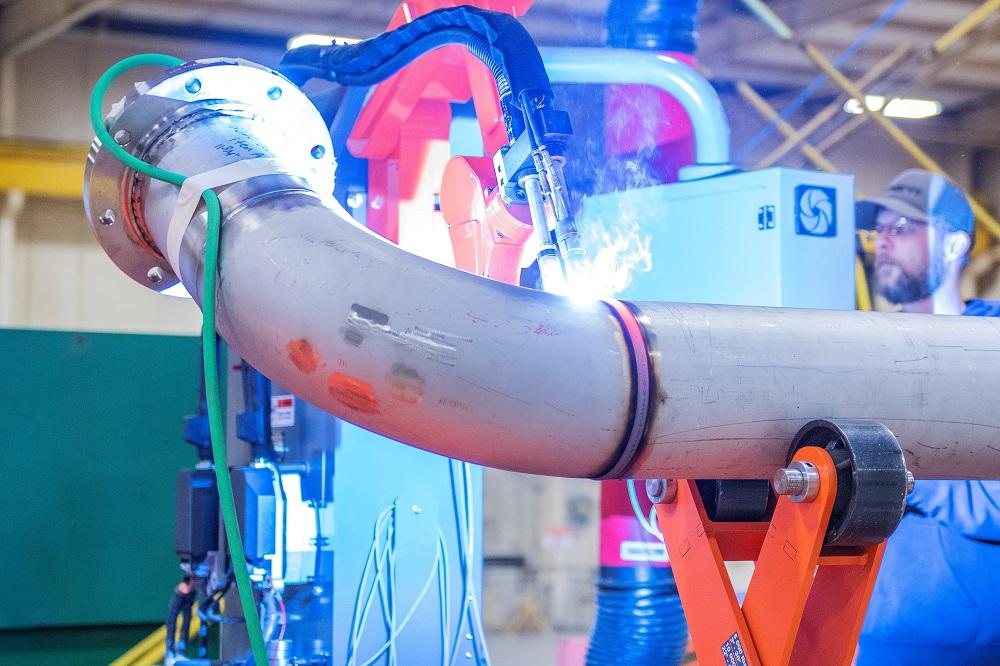The Role of AI and Automation in Pipe Fabrication
The industrial manufacturing sector is experiencing significant changes due to AI and automation technologies. Pipe fabrication is one industry greatly affected by these advancements due to its inefficiencies and high costs. AI and automation solutions can help streamline operations, decrease waste, and improve overall efficiency in pipe fabrication processes. This transformation highlights the role of technology in revolutionizing traditional manufacturing methods. Companies in the pipe fabrication sector can leverage AI and automation to enhance their operations and competitiveness.

The industrial manufacturing sector is undergoing a major transformation, driven by advancements in artificial intelligence (AI) and automation. One of the industries seeing the most impact is pipe fabrication, where traditional methods often lead to inefficiencies, high costs, and errors. With AI-powered solutions and automation, pipe fabrication companies can streamline operations, reduce waste, and enhance productivity.
The Challenges of Traditional Pipe Fabrication
Before diving into how AI and automation are changing the industry, let’s examine some of the long-standing challenges in pipe fabrication:
- Manual Design Errors: Traditional CAD and blueprint designs often require significant human intervention, increasing the risk of mistakes.
- Material Waste: Inefficient cutting and planning lead to excessive material waste, raising costs.
- Slow Production Timelines: Relying on manual processes slows down production, affecting project deadlines.
- Lack of Real-Time Data: Without automation, companies struggle to track and optimize fabrication workflows effectively.
- Workforce Shortages: Skilled labor shortages make it difficult for companies to scale production efficiently.
These challenges have persisted for decades, making it crucial for businesses to adopt new technological solutions that can overcome these obstacles. Without modernization, companies risk falling behind their competitors who are leveraging advanced technologies to optimize their workflows and reduce production costs.
How AI and Automation Improve Pipe Fabrication
1. Predictive Analytics for Error Reduction
AI-powered software can analyze design blueprints and identify potential errors before fabrication begins. This predictive capability minimizes costly mistakes and reduces rework, saving both time and materials.
2. Automated Material Optimization
Modern pipe fabrication software uses AI-driven algorithms to optimize material usage. This leads to better cutting plans, lower costs, and sustainable manufacturing practices.
3. Enhanced Workflow Efficiency
Automation streamlines the entire pipe fabrication process, from design to execution. Benefits include automated welding & cutting, real-time monitoring, and smart scheduling.
4. Improved Compliance and Quality Control
AI helps ensure that fabricated pipes meet industry standards and regulations. Automated inspections use machine learning to detect defects early, reducing the risk of compliance violations and project delays.
The Benefits of AI-Powered Pipe Fabrication for Manufacturers
Adopting AI and automation in pipe fabrication leads to significant advantages, including increased production speed, higher precision, cost savings, scalability, real-time insights, and improved safety.
How PipeCloud is Leading the AI and Automation Revolution
PipeCloud is at the forefront of pipe fabrication software, offering a comprehensive solution to modern manufacturing challenges. Key features include AI-powered design optimization, cloud-based collaboration, real-time project tracking, integration with existing tools, and automated reporting & compliance checks.
The Future of Pipe Fabrication: Why AI is Here to Stay
The demand for AI and automation in industrial manufacturing is only expected to grow. Investing in smart fabrication solutions like PipeCloud will be critical for staying competitive in the industry. Key trends shaping the future include AI-driven predictive maintenance, increased use of robotics, advanced machine learning algorithms, greater cloud integration, automated inventory management, and 3D printing with AI-assisted prototyping.
HONESTAI ANALYSIS
AI and automation are revolutionizing pipe fabrication, making the process faster, more efficient, and cost-effective. By adopting AI-powered software like PipeCloud, manufacturers can overcome traditional fabrication challenges and embrace a more streamlined, data-driven approach. If you’re looking to optimize your pipe fabrication process, now is the time to invest in intelligent, automated solutions that will keep your business ahead of the competition.
For more details on AI-driven fabrication software, check out PipeCloud and start transforming your manufacturing operations today!

